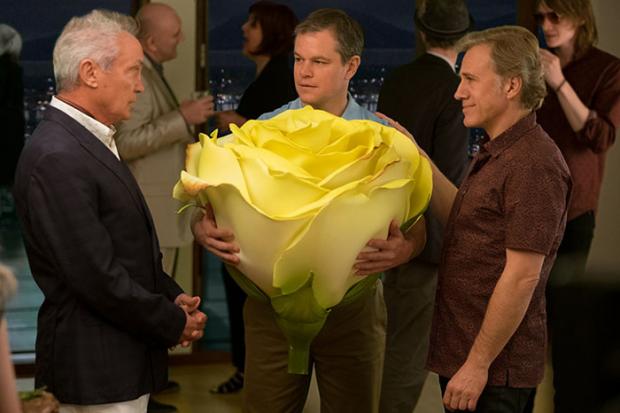Downsizing
Sometime in the late 1980s I suffered through a videocassette of Slapstick of Another Kind, an awful movie based on a novel that Kurt Vonnegut considered one of his worst. The book, written in 1976, was called Slapstick, and Vonnegut hated the movie even more, so much so that he demanded that they change the title. It starred Jerry Lewis and Madeline Kahn as deformed idiot space babies, and trust me, that’s making it sound better than it is.
Being an optimist, as all film reviewers are (because how else could we do this job?), I found one intriguing thing in the movie, an idea that stayed with me all these years. In it, the Chinese have developed a program to deal with the scarcity of resources by shrinking humans to a size of a few inches. I always found that an interesting idea, and wished the film had done more with it, or that someone else would use the idea.
All things come to the patient, and now we have Downsizing, a new film by Alexander Payne and his longtime collaborator Jim Taylor, in which Danish scientists devise a method to shrink humans to four or five inches. The idea, of course, is that the world’s diminishing resources can be stretched much further if the human population literally reduces its collective footprint.
Our guide to this small new world is Paul Safranek, a fellow so average that he is played by Matt Damon, one of the few contemporary Hollywood stars capable of making you think he really could be a support staff worker at Omaha Steaks. About all that has changed in Paul’s life over the course of his adulthood is that he goes from catering to the needs of his mother to catering to the needs of his wife (Kristen Wiig).
Childless and financially inert, they’re the perfect couple to take advantage of what has become known as “getting small” (which may or may not be a Steve Martin reference). Their minimal savings and home equity will be more than enough to allow them to retire and live a life of luxury in a community where no one is taller than five inches.
As tends to happen in movies like this, I was distracted by millions of questions, some of which Payne and Taylor address. A pre-shrinking scene finds Paul in a bar fight with a fellow who feels that so many people opting out of the economy to live on their savings will be at the expense of those who remain behind. Surely this would cause an entire new social gap, as many workers would have to remain full sized to support the infrastructure designed to house and protect the small. And it would only take one mad big person to raze an entire community of his betters, as anyone who has ever watched an old school Godzilla movie knows.
Also, worms. You can protect these small communities from peckish birds with a biodome, but when you become the same length as an earthworm, an earthworm is about the last thing you would want to encounter.
Unfortunately that is not where this movie is going. Far from perfection, Paul’s new life is a disappointment to the degree that it changes, and a drag to the extent that it doesn’t change at all. Enter two Serbs who have found a novel way to make a fortune from smallness (Christoph Waltz and the unique Udo Kier) and a Vietnamese humanitarian worker supporting herself doing housework (Hong Chau), and Paul is off to save the world, or at least witness its demise.
Downsizing is so unlike anything else that Payne has ever done that I found myself wondering if he had been hired to direct someone else’s script. His approach to the sci-fi aspects of the story is comically droll, bringing to mind futuristic comedies like Mike Judge’s Idiocracy and Woody Allen’s Sleeper. (My favorite gag: a roomful of newly shrunken subjects are removed from their beds by hospital workers with spatulas.) It turns out that that stuff is only a means to an end, a more serious one about man’s stewardship of the planet and duty to his fellow man. I think Payne and Taylor got carried away with their vehicle. I can’t say that I blame them, but I wish they hadn’t used it to take us on a 135 minute ride to someplace that is less interesting instead of exploring their starting point more thoroughly.

